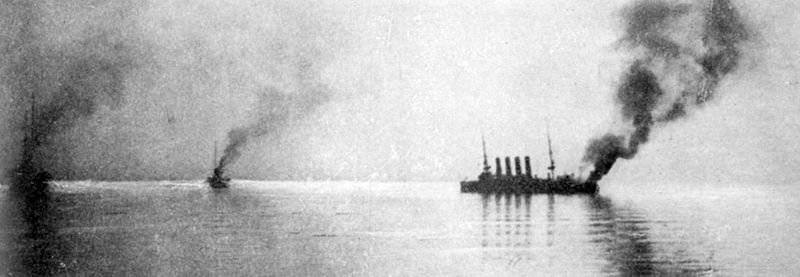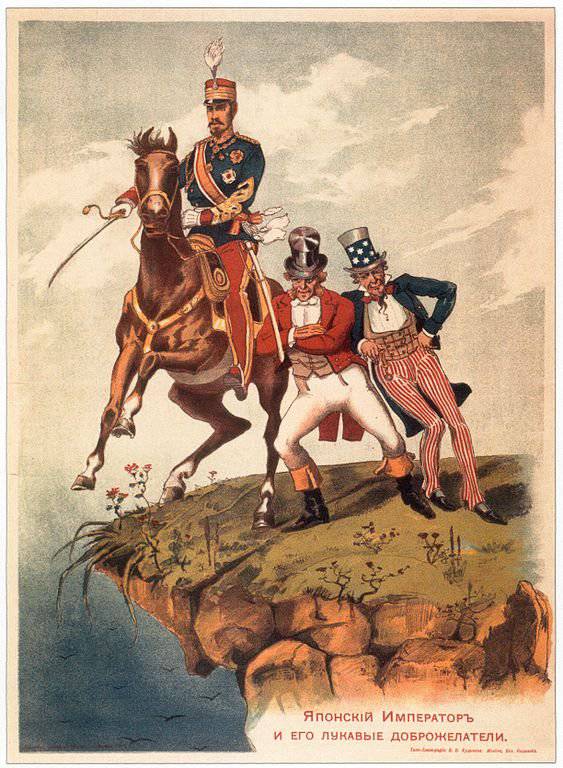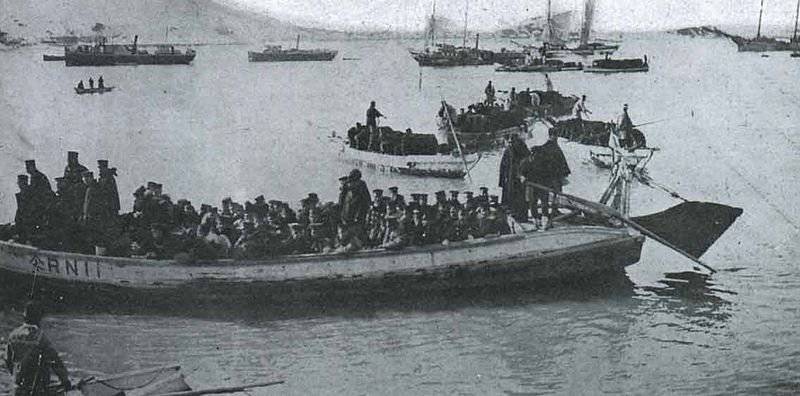"Japan leads our game." To the 110 anniversary of the beginning of the Russian-Japanese war
Thus began a bloody war, full of the heroism of Russian sailors and soldiers, who had to clear up the mess of the prewar and military mistakes of the government. Despite a series of defeats on land and at sea, the Russian armed forces practically solved the task of victory over the Japanese empire. However, backstage intrigues and weak political will of St. Petersburg led to the fact that Russia went to peace negotiations and gave the victory to Japan, which was already on the verge of defeat. Japan was threatened with a financial default (only Anglo-Saxon-Jewish loans allowed Japan to wage war). The Russian army fulfilled Kuropatkin’s strategic plan, which in fact repeated Kutuzov’s maneuver in 1812. By the beginning of the political negotiations, the Russian army was at the peak of its capabilities, the Japanese army ran out of steam, lost its offensive capabilities. The upcoming offensive of the Russian army could lead the Japanese to a military-political catastrophe. The population of Japan was significantly less Russian, its demographic resource was exhausted. Japan has already lost personnel reserve, he fell on the battlefield. Russia, on the other hand, has only "reeled off."
The ratio of casualties says that Russian troops fought on land more skillfully than the Japanese. In the work of V. Shatsillo, L. Shatsillo “Russian-Japanese War. 1904 — 1905. Data. Documents "it is reported that the Russians have lost the killed 50 thousand people, the Japanese - more than 86 thousand people. AT "Stories B. Urlanis military losses: Russian losses on land - 177 thousand people (31 thousand killed and died from wounds), Japanese - 232 thousand people (58 thousand killed and died from wounds). According to General Kuropatkin: the total losses of Japan killed, wounded and sick amounted to 554,8 thousand people. Only in Tokyo, more than 60 thousand people were buried in the honorary cemetery.
In a report to Foreign Minister V. N. Lamsdorf, Russia's envoy to Japan, and then the second representative of Russia during the peace talks in Portsmouth, Roman Romanovich Rosen noted: “... despite all the victories over us at sea and on land, Japan has no means who would give her the opportunity to force Russia to make peace and pay a military contribution if Russia chose to avoid it and decided to continue at least passive resistance. ” Japan simply did not have the strength to transfer the war directly to Russian territories, even to the CER zone. Theoretically, the Japanese could land in Sakhalin, and they landed it. But to support him, they had to hold significant naval forces, and they were ready for evacuation at any moment. In the very first harsh winter, Japanese troops on Sakhalin were doomed to death.
Thus, Japan won, not because of its military and economic superiority, but because of the fact that Petersburg decided to surrender. Russia's western "partners and friends" simply convinced the Russian elite to conclude a peace agreement. They were played up by “agents of influence” like Witte. Japan in general was able to fight with Russia (taking into account the potential difference) only because of the full-scale political-diplomatic, informational, military-material and financial support of the British Empire and the United States, as well as the “financial international” behind them.

"Varyag" and "Korean" go to battle.
Background of war
There are two main prerequisites for the Russian-Japanese war 1904-1905: 1) is the strategic weakness of the Russian Empire in the Far East and many lost opportunities to strengthen its position in the Asia-Pacific region; 2) purposeful work so-called. "Financial International", Great Britain and the United States to Russia and Japan. The Anglo-Saxons sought to knock out Russia from the APR by the hands of the Japanese and deploy Russia to Europe, where it had to fulfill the role of "cannon fodder" in the war with Germany.
As everyone knows, the weak are beaten, and the fools are taught. The history of the development of the Far East by Russians is full of examples of self-sacrifice, heroism and asceticism of some, and carelessness, greed, stupidity and frank betrayal of Russia's national interests by others. While devotees and statesmen such as Alexander Baranov, Gennady Nevelskoy and Nikolai Muravyov-Amursky built up, opened, built and strengthened Russian frontiers, others gave away, sold and simply turned a blind eye to the opening opportunities.
Russian researchers and devotees laid at the end of the XVIII first half of XIX centuries. the enormous potential that enabled the Russian Empire to become the dominant force in the Asia-Pacific region, especially in its northern part. Russia owned Kamchatka, Primorye, we got the full right to the Kuriles and Sakhalin, the Aleutian Islands were developing, Russian America, Fort Ross in California was our outpost. The Hawaiian Islands insistently asked for membership in the Russian Empire. On the islands even laid a Russian outpost. In the second half of the XIX - early XX centuries. there was the possibility of transition under the Russian protectorate of Korea, with the gradual inclusion of the empire. Koreans stubbornly did not want to obey the Japanese and looked with hope at the Russians, who were their only hope for a prosperous life. In Korea, there was a strong "Russian party". This opportunity has been missed. The opportunity to establish friendly and even allied relations with Japan was missed. In Nagasaki there was even a parking of the Russian fleet. In reality, for a very long time, there were no particular contradictions between Japan and Russia, and the two powers could become natural allies in the region.
However, thanks to the vague foreign policy of St. Petersburg, bureaucratic red tape and the work of the "agents of influence" of the West, Russia has lost most of its opportunities in the APR. Fort Ross and Russian America were sold. It was a brilliant operation by opponents of Russia, we lost all positions in America and the possibility of full control over the northern part of the Pacific Ocean. Petersburg was literally “occupied” by a pro-Western group that looked only at Europe, which didn’t care what happened in the Far East. Nevelskoy and Muravyov literally accomplished a feat when they were able to join the mouth of the Amur to Russia. Nevelsky even wanted to be judged and degraded into sailors, saved by the personal intercession of Emperor Nicholas I.
As a result, for a long time, the Far East remained an almost unnecessary margin of the Russian Empire. Transport and military infrastructure was not developed. Only in 1903, was the movement on Transsib opened throughout its length. Petersburg did not use the opportunity to annex the Korean Peninsula and to peacefully resolve disputed issues with Japan. When Russia was dragged into Chinese affairs, including participation in the suppression of the uprising of the “boxers”, the construction of the CER, the lease of Port Arthur, the clash of Russian-Japanese interests in Korea, it was no longer a gradual expansion of Russian influence in East Asia, but mistakes. Russia was deliberately pulled into China and confronted with Japan. A group of businessmen from Petersburg, some of whom were associated with the "financial international", dragged Russia into Korean and Chinese affairs. Sergei Witte, the future “half count of Sakhalin”, played a huge role in this matter (read more about the destructive role of this leader in the work of S. Kremlev “Russia and Japan: Bleed!”).
At the same time, "financial international", Britain and the United States did everything to pit Russia and Japan. Russia, as noted above, had every chance to become the dominant force in the Pacific Ocean, especially its northern part. This did not suit the owners of the Western project, as well as the British Empire and the United States, who themselves wanted to dominate the APR. Moreover, the turn of Russia to the East, distracted her from European affairs, which also did not suit England. According to the plans of the Anglo-Saxons, Russia was to play a decisive role in the war with the Teutons. And then the Russians “distracted” from Europe, got bogged down in Eastern affairs.
The operation to remove Russia from the Pacific zone was carried out in several stages. First, the operation “sale of Russian America” was carried out. Then they “raped” and awakened Japan (the mission of the squadron of the American Commodore Perry), who was dozing in her isolation and was not going to interfere in the affairs of her neighbors. England, and other Western countries, took an active part in the militarization of Japan, creating in it a first-class fleet and army, trained and armed according to European standards. The British actually created the Japanese fleet, the United States and France actively participated in this work. The test of strength took place in China, which was then offended and robbed by all and sundry. Sino-Chinese War 1894 — 1895 ended with a complete victory of the Japanese Empire. China was forced to give away the island of Taiwan, Penghu Islands and the Liaodong Peninsula, to pay a large indemnity, which was sent to further militarization.
Russia, Germany and France intervened and took away part of their loot from Japan. Japan was forced to withdraw its troops from the Liaodong Peninsula. Russia concluded an allied treaty with China, acquiring the right to build a railway through the territory of Manchuria. In 1898, Russia received the ports of Port Arthur and Dalny (Dalian) with adjacent territories and water space. Russia also received the right to lay railways to these ports from the CER (South Manchurian Railway). Thus, Russia took Japan’s Liaodong Peninsula captured during the war with China, which led to a new wave of militarization and anti-Russian military psychosis.
Japan nevertheless tried to reach an agreement and conclude an agreement with Russia on the division of spheres of influence in Korea and Manchuria. Ito Hirobumi proposed to leave Manchuria for Russia, and Korea should have become the sphere of influence of Japan. However, Ito's initiative did not find understanding in Petersburg. Therefore, the Japanese government decided to conclude an alliance with the British Empire. 17 (January 30) The Anglo-Japanese Treaty was signed on 1902 of the year, which deprived Russia of the support of any European power. Japan received a reliable rear. Subsequently, Japan received full financial support from England and the United States, without which it would not have been able to fight at all, and the pumping of the military, especially the naval muscles of the Japanese Empire, continued.
At the end of July 1903, Japan again proposes Russia to discuss the Far East issue. Apparently, Japan was still trying to solve the matter in peace. The Japanese knew that the potentials of Russia and Japan were very different, in favor of the Russian state. Russia could transfer almost the entire composition of the combat fleet from the west of the empire to the east. Relations with Germany were good then. During the years of the Russian-Japanese war, Germany in general acted and behaved as practically the only ally of Russia. Berlin was the only one that would benefit from the reorientation of Russia to the Pacific Ocean. The immensity of the Russian army simply frightened the Japanese (the peacetime Russian army was more than 1 million, the Japanese army 180 thousand. People). These fears were all the more justified because there was still no confidence in one’s own army. Japanese soldiers were trained by French and German instructors, but the new Japanese army had not yet dealt with a strong enemy. The assets of the Japanese was only a victory over completely degraded China. It was scary to fight with Russia. The opportunity to negotiate still existed, despite all the podnachivaniya from the Anglo-Saxons.

Russian poster of the beginning of the Russian-Japanese war, 1904. The Japanese emperor and his crafty well-wishers: John Bull and Uncle Sam.
In August, the Japanese handed over the draft agreement to the Russian Foreign Ministry 1903. Both sides had to recognize the independence and territorial integrity of Korea and China, and uphold the principle of equality in the commercial and industrial sphere. Russia had to recognize the predominance of Japanese interests in Korea, the Japanese recognized the special railway-building interests of Russia in Manchuria. Japan received the right to continue the railways built in Korea to South Manchuria, until the connection with the CER and the branch of the southern part of the CER to Beijing. Thus, the Japanese did not demand the abandonment of Port Arthur, but they blocked the economic activity of Russia in Korea and limited it in Manchuria. The Japanese gained wide access to North-East China. Moreover, it was only a project, negotiations could continue.
In general, this project was worthy of attention. Port Arthur, Dalny remained for Russia, the Japanese did not claim the CER and its branches. The further expansion of Russia, taking into account all the lost opportunities of the whole century, did not have much meaning. We already got everything we needed. The most important thing Russia had was a naval base in the southern seas and the railway to it. However, St. Petersburg is going to aggravate. October 5 Japan sent a reciprocal project, which included the recognition by Russia of the predominant interests of the Japanese in Korea, in exchange for Japan’s recognition of Manchuria as lying outside its sphere of interest. The provision on the exclusion of Manchuria from its zone of interests of Japan categorically did not treble. In December, 1903, Japan presents an ultimatum to Russia, demanding full recognition of its rights in Korea.
At the same time, Japan receives an encouraging push from the United States. On the same day, October 8 1903, the United States and Japan enter into trade agreements with China. Both Britain and the United States "advise" (point out) to China not to be friends with Russia. Then, the United States officially assured Japan that in the event of war, American policy would be sympathetic to the Empire of Shinto. Already during the war, US President Theodore Roosevelt will declare: "I will be extremely pleased with the victory of Japan, for Japan is playing our game."
Quite clearly anti-Russian game noticed in Berlin. 9 January 1904, Kaiser Wilhelm wrote to Emperor Nicholas: “... God grant that everything goes smoothly and that the Japanese listen to the voice of reason, despite the bitter efforts of the vile press of some country. It seems that she decided to throw money without end into the bottomless well of the Japanese mobilization. ” True, here it is necessary to correct the German emperor. More precisely, "they decided" - England and the United States.
At the beginning of 1904, at the special invitation of the Japanese emperor, the American war minister Taft arrived in Japan, who conveyed Roosevelt’s promise to give Japan military support if France and Germany took the side of Russia. And Japan decided to go to war.
A break up
The Japanese Foreign Ministry 5 in February 1904 of the year instructed by telegraph the ambassador in St. Petersburg to stop negotiations and terminate diplomatic relations with the Russian Empire. February 6 Japan officially announced the severance of diplomatic relations with Russia. The Russian response to the December ultimatum left 3 in February, but was detained in Nagasaki and delivered to Rosen only in February 7. January 22 (February 4) 1904 of the year in Japan held a joint meeting of the members of the Privy Council and the Cabinet of Ministers, at which it was decided to start a war against Russia. On the night of January 23 (February 5), an order was issued to disembark the assault force in Korea about the attack of the Russian squadron in Port Arthur. January 24 (February 6) Japanese fleet leaves for combat positions. Formally, Japan declared war on Russia on January 28 (February 10).

The landing of Japanese troops in Chemulpo.
To be continued ...
Information